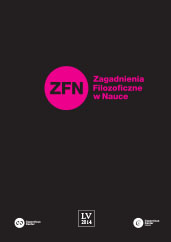Dlaczego jest mnóstwo rzeczy raczej niż prawie nic? – „słabe pytanie Leibniza”
Why is there a lot of things rather than almost nothing? – weak Leibniz’s question
Author(s): Łukasz LamżaSubject(s): Metaphysics, Early Modern Philosophy, Philosophy of Science, Ontology
Published by: Copernicus Center Press
Keywords: philosophy of nature; Leibniz’s question; cosmology;
Summary/Abstract: The original Leibniz’s question „Why is there something rather than nothing?” is rephrased in a „weak” way: „Why is there a lot of things rather than almost nothing?”. The first part of the article argues for two propositions: 1) We may not reasonably expect a real answer to the original Leibniz’s question, mostly because the concept of „nothingness” cannot be defined in a way that makes sense and is operational. 2) The „weak” version of the question retains the philosophical „spirit” of the original. In the second part a methodology for answering the weak Leibniz’s question is presented - one of an analysis of the cosmic evolution in terms of the reasons and causes for the emergence of new types of natural objects and processes („things”). A representation the structure of the Universe is presented that is based on a list of ca. 900 names of things derived from the Universal Decimal Classification (UDC) catalogue, representing all natural sciences. Further analyses concern the properties of the Universe and its evolution that cause new things to emerge all the time – although one may imagine and precisely describe a scenario where new things stopped appearing shortly after the Big Bang and now there is almost nothing in the Universe.
Journal: Zagadnienia Filozoficzne w Nauce
- Issue Year: 2014
- Issue No: 55
- Page Range: 91-127
- Page Count: 37
- Language: Polish

